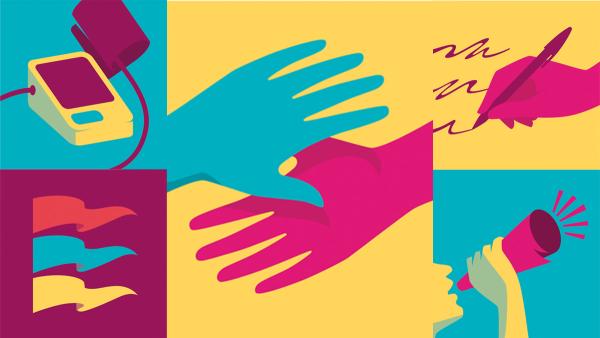Placement providers are also required to make reasonable adjustments so that learners can take part in the practice experience

Adjustments for academic work are a routine part of teaching and learning with an emphasis on inclusion rather than accommodation.
Placement providers are also required to make reasonable adjustments so that learners can take part in the practice experience, and this works best if the university, placement provider and learner collaborate to address any potential barriers.
The AHP principles of practice-based learning supports the development of practice-based learning experiences by outlining ways to encourage inclusivity.
How to make placements as accessible as possible
Advice for universities
The university should create a culture where learners feel enabled to disclose learning needs and signposting clearly to the support available. Any medical information is confidential and can only be disclosed with consent from the learner.
Ensure learners know that they are in control of their personal support assessment plans, and they are the drivers in information sharing. Focus on individualised and learner centric approaches to support.
Have a named member/s of staff as a point of contact for placement educators and learners seeking support.
Provide education for practice educators in relation to the specific needs of learners and reasonable adjustments and support the development of a learner centred and individualised approach to learners on placements.
Consider flexibility in placement selection to enable individual learners to thrive. Practice experiences are about ensuring learners meet learning outcomes rather than fulfilling an arbitrary profile based on practice settings.
Physiotherapy education does not require rotating through all areas as a traditional model of practice. Tailoring practice placements and placement profiles is a reasonable adjustment which does not impact on learning if learners are supported to gain these skills across other aspects of the programme.
Aim to follow up with learners on placement that any reasonable adjustments have been implemented or that alternative adjustments have been put in place.
Advice for learners
Disclose any needs as early as possible and also consent to sharing support needs with placements. This enables everyone to work together in advance of the start of the practice-based learning experience.
Placement providers must treat information about impairments or long-term conditions as confidential. If you do not make them aware, your placement provider cannot reasonably be expected to know about an impairment or long-term condition which might affect your learning experience.
Complete the learning agreement of the Common Placement Assessment Form (CPAF) and discuss this with your educator as near to the start of placement as possible.
Visit the practice placement prior to starting, if possible, with university support staff and alongside the practice educator to identify potential issues and work together to plan adjustments
You may become aware of a support need, impairment or long-term condition during the placement experience. Take the initiative to discuss this with your educator and decide if the practice setting and university can provide support, guidance, advice or facilitate an assessment to provide a personal plan.
Communicate regularly with your university support staff to ensure support needs for you and the practice educator are being addressed.
Advice for placement educators
Be proactive about asking learners how you can support their learning where the aim is to avoid intrusive questioning where a learner is not ready to disclose. It could be useful to use the CPAF learning agreement as a starting point to help identify learning needs or other support.
You may become aware of a learner’s support need, impairment or long-term condition during the placement experience. Again, take the initiative to discuss this with your learner and decide if the university can provide support, guidance, advice or facilitate an assessment to provide a personal plan.
Placement providers and educators must treat information about a learner's impairments or long-term conditions as confidential.
Communicate regularly with your university support staff to ensure support needs for the learner and you are being addressed.
Consider your own professional development and explore information and resources about specific educational needs and reasonable adjustments in healthcare education.